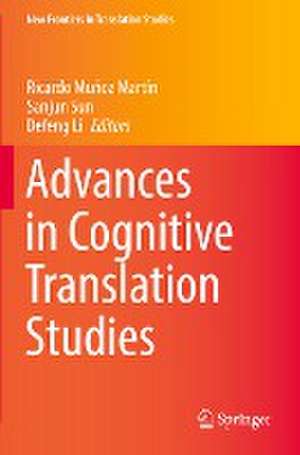Advances in Cognitive Translation Studies: New Frontiers in Translation Studies
Editat de Ricardo Muñoz Martín, Sanjun Sun, Defeng Lien Limba Engleză Paperback – 20 noi 2022
| Toate formatele și edițiile | Preț | Express |
|---|---|---|
| Paperback (1) | 580.82 lei 6-8 săpt. | |
| Springer Nature Singapore – 20 noi 2022 | 580.82 lei 6-8 săpt. | |
| Hardback (1) | 729.68 lei 6-8 săpt. | |
| Springer Nature Singapore – 19 noi 2021 | 729.68 lei 6-8 săpt. |
Din seria New Frontiers in Translation Studies
-
 Preț: 398.35 lei
Preț: 398.35 lei - 18%
 Preț: 892.90 lei
Preț: 892.90 lei -
 Preț: 397.38 lei
Preț: 397.38 lei - 15%
 Preț: 581.65 lei
Preț: 581.65 lei - 15%
 Preț: 692.74 lei
Preț: 692.74 lei - 15%
 Preț: 645.14 lei
Preț: 645.14 lei -
 Preț: 374.76 lei
Preț: 374.76 lei - 15%
 Preț: 691.45 lei
Preț: 691.45 lei -
 Preț: 382.75 lei
Preț: 382.75 lei - 18%
 Preț: 950.52 lei
Preț: 950.52 lei - 15%
 Preț: 691.12 lei
Preț: 691.12 lei - 15%
 Preț: 699.28 lei
Preț: 699.28 lei - 24%
 Preț: 640.92 lei
Preț: 640.92 lei - 15%
 Preț: 583.78 lei
Preț: 583.78 lei - 18%
 Preț: 995.02 lei
Preț: 995.02 lei - 18%
 Preț: 729.68 lei
Preț: 729.68 lei - 18%
 Preț: 940.39 lei
Preț: 940.39 lei - 18%
 Preț: 952.72 lei
Preț: 952.72 lei - 18%
 Preț: 786.66 lei
Preț: 786.66 lei - 15%
 Preț: 644.82 lei
Preț: 644.82 lei - 15%
 Preț: 634.82 lei
Preț: 634.82 lei - 24%
 Preț: 745.08 lei
Preț: 745.08 lei - 18%
 Preț: 1000.87 lei
Preț: 1000.87 lei - 18%
 Preț: 959.82 lei
Preț: 959.82 lei - 15%
 Preț: 584.43 lei
Preț: 584.43 lei - 18%
 Preț: 729.68 lei
Preț: 729.68 lei - 20%
 Preț: 722.76 lei
Preț: 722.76 lei -
 Preț: 388.72 lei
Preț: 388.72 lei - 18%
 Preț: 952.40 lei
Preț: 952.40 lei - 18%
 Preț: 729.06 lei
Preț: 729.06 lei -
 Preț: 392.37 lei
Preț: 392.37 lei - 18%
 Preț: 892.90 lei
Preț: 892.90 lei
Preț: 580.82 lei
Preț vechi: 683.32 lei
-15% Nou
Puncte Express: 871
Preț estimativ în valută:
111.14€ • 116.35$ • 91.96£
111.14€ • 116.35$ • 91.96£
Carte tipărită la comandă
Livrare economică 05-19 aprilie
Preluare comenzi: 021 569.72.76
Specificații
ISBN-13: 9789811620720
ISBN-10: 9811620725
Pagini: 220
Ilustrații: X, 220 p. 30 illus., 15 illus. in color.
Dimensiuni: 155 x 235 mm
Greutate: 0.33 kg
Ediția:1st ed. 2021
Editura: Springer Nature Singapore
Colecția Springer
Seria New Frontiers in Translation Studies
Locul publicării:Singapore, Singapore
ISBN-10: 9811620725
Pagini: 220
Ilustrații: X, 220 p. 30 illus., 15 illus. in color.
Dimensiuni: 155 x 235 mm
Greutate: 0.33 kg
Ediția:1st ed. 2021
Editura: Springer Nature Singapore
Colecția Springer
Seria New Frontiers in Translation Studies
Locul publicării:Singapore, Singapore
Cuprins
Advances in Cognitive Translation Studies: An Introduction.- A Task Segment Framework to Study Keylogged Translation Processes.- Bridging paradigms to approach expertise in cognitive translation studies.- The Effort Models of interpreting as a didactic construct.- Situated translators: Cognitive load and the role of emotions.- Translation Competence Revisited: Towards a Pedagogical Model of Translation Competence.- Uncertainty management and interpreting competence: An eye-tracking study.- Consultation Behaviour with Online Resources in English-Chinese Translation: An Eye-tracking, Screen-recording and Retrospective Study.- The impact of directionality on metaphor translation cognitive pattern.- Measuring the user experience of computer-aided translation systems.
Notă biografică
Ricardo Muñoz Martín is professor of Translation Studies at the University of Bologna at Forli, Italy, where he directs the Laboratory for Multilectal Mediated Communication & Cognition (MC2 Lab). Muñoz is is co-founder and co-editor of the journal Translation, Cognition & Behavior and a member of the international research network TREC.
Sanjun Sun is Associate Professor of Translation Studies at Beijing Foreign Studies University, Beijing. He is co-editor of the Chinese journal Translation Horizons, an external associate of the MC2 Lab at the University of Bologna, and a member of the international research network TREC. His research interests include cognitive translation studies and translation technology.
Defeng Li is the professor of Translation Studies at the University of Macau. He has researched and published extensively in Translation Studies as well as Second Language Education. He takes a keen interest in data-basedempirical translation studies, cognitive and psycholinguistic investigation of translation processes, and curriculum development in translation education.
Sanjun Sun is Associate Professor of Translation Studies at Beijing Foreign Studies University, Beijing. He is co-editor of the Chinese journal Translation Horizons, an external associate of the MC2 Lab at the University of Bologna, and a member of the international research network TREC. His research interests include cognitive translation studies and translation technology.
Defeng Li is the professor of Translation Studies at the University of Macau. He has researched and published extensively in Translation Studies as well as Second Language Education. He takes a keen interest in data-basedempirical translation studies, cognitive and psycholinguistic investigation of translation processes, and curriculum development in translation education.
Textul de pe ultima copertă
This book presents the latest theoretical and empirical advances in cognitive translation studies. It involves the modes of written translation, interpreting, sight translation, and computer-aided translation. In separate chapters, this book proposes a new analytical framework for studying keylogged translation processes, a framework that reconciles a sociological and a psychological approach for studying expertise in translation, and a pedagogical model of translation competence. It expands the investigation of cognitive processes by considering the role of emotional factors, reviews, and develops the effort models of interpreting as a didactic construct. The empirical studies in this book revolve around cognitive load and effort; they explore the influences of text factors (e.g., metaphors, complex lexical items, directionality) while taking into account translator factors and evaluate the user experience of computer-aided translation tools.
Caracteristici
Brings together a group of translation scholars Combines both theoretical expertise and empirical research Illustrates for students and scholars in translation studies
